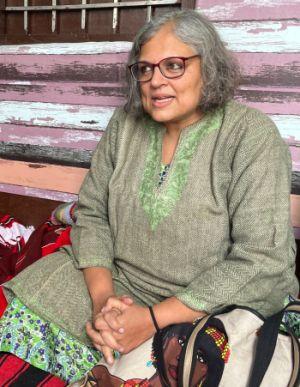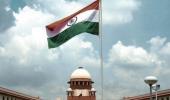'I see this judgment as a chance to say 'Boo' to the dark. But we shouldn't lose sight of the larger darkness that we have to keep fighting in everyday ways.'

Author of The Anatomy of Hate, a book which went deep into what motivated the rioters of Gujarat 2002, Revati Laul is both a journalist and activist. Through her NGO Sarfaroshi Foundation that she runs in Shamli, Uttar Pradesh, the 50-year-old tries to fight the politics of hatred that surrounds us today.
"I have been tracking this case because the protagonist in my book went from being a fanatic to a changed person after he met Bilkis Bano," Laul, a co-petitioner in the case against the remission granted to Bilkis Bano's rapists, tells Jyoti Punwani.
Did you expect this judgment?
No, not at all. I tend to be cynical and believe the worst, so that I might get pleasantly surprised by the outcome.
Have you always been so or is this because of the way Supreme Court judgments have been going recently?
In the last decade more so, but I've always prepared myself for the worst. As a journalist, one sees the worst, so you expect that. I have to say I didn't expect this judgment.
How did you come to file this petition? Did you know Bilkis Bano?
It was Subhashini Ali who drafted this petition with Kapil Sibal's team. They had two petitioners and were looking for a third. They called me and I said yes, of course.
I am embarrassed claiming any part of this victory. I didn't draft the petition, I didn't think of it either, though I felt terrible that 'Azaadi ka amrit kaal' was used to grant remission to these rapists.
I don't know Bilkis Bano though I've met her once. I was the NDTV correspondent after the Gujarat violence, and was at the press conference held after these men were convicted. I heard Bilkis Bano say that she didn't want the death penalty for them, but they should get a life sentence.
I have been tracking this case because the protagonist in my book went from being a fanatic to a changed person after he met Bilkis Bano. But I didn't want to meet her and have her regurgitate her experience. That kind of voyeurism wasn't essential to the story I was telling.
Does this judgment give you hope in carrying on with the work that you are doing?
I feel good about it, specially given the state that I work in, surrounded by polarisation, patriarchy... But though I'm cynical, the work I do reaffirms my faith in people. I still have hope; that comes not from the administration, but from people.
Working with all kinds of people, I've realised that the Right Wing is not a monolith. Many of those who stick to the administration do so out of a sense of bravado.
There are also a lot of caste complexities at work. People stick to a bigger bully to vanquish the dominance of those they consider a threat. I've seen this in Shamli.
When you break into this pattern, you realise there's hope in people. Hannah Arendt spoke of the banality of evil. There's also the banality of the opposite of evil. Pushing back happens often in banal and everyday ways.
This verdict certainly helps; we can use it as a signpost to magnify the hope we have.
I see this judgment as a chance to say 'Boo' to the dark. But we shouldn't lose sight of the larger darkness that we have to keep fighting in everyday ways.
 IMAGE: Revati Laul Photograph: Jyoti Punwani
IMAGE: Revati Laul Photograph: Jyoti PunwaniAre you scared of the repercussions of this judgment, considering that the decision that's been struck down was taken by the most powerful people in the country?
No.
I'm more scared of not doing anything. I don't want to die thinking I didn't resist, or I became part of the status quo. At the same time I don't want to be strident, some kind of stupid soldier who goes to fight on the front without a strategy.
I was in college when the Babri Masjid was demolished. We had drafted a letter against it, which was published by The Times of India. I remember my college president telling me she was signing it because she was the president, but she believed the masjid should have been demolished much earlier, and Muslims should be thrown out of the country.
If you had your ear to the ground, this was the surround-sound then. This is when I decided to become a journalist.
So that is always going to be the primary motivator in whatever decision I take. That's the thread that runs through what I do and I stick to it, because I believe in it. It's not that I suddenly woke up when I was 48 and was shocked by the remission of these men. It's a continuation of what I decided when I was 19.
Feature Presentation: Aslam Hunani/Rediff.com










